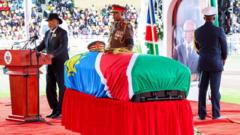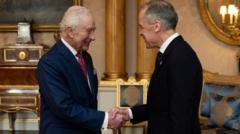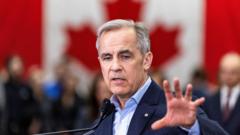Namibia's government has decided to temporarily halt state funerals until April 2026, following criticism surrounding the high costs associated with such events. A committee will review the policies related to official funerals as the government faces scrutiny from citizens regarding expenses incurred during recent high-profile funerals.
Namibia Suspends State Funerals Amid Criticism Over Costs

Namibia Suspends State Funerals Amid Criticism Over Costs
The Namibian government enacts a temporary ban on state funerals, citing rising public discontent over funeral expenses.
The Namibian government has announced a temporary suspension of state funerals due to increasing public criticism over their escalating costs. Following a Cabinet meeting, Minister of Information and Communication Technology Emma Theofelus revealed that only President Netumbo Nandi-Ndaitwah can grant exemptions to this moratorium, which will last until April 2026.
The announcement follows growing concerns over financial allocations to state funerals, particularly highlighted by the reported costs associated with founding President Sam Nujoma's funeral. Reports indicate that the government spent approximately 30 million Namibian dollars (around $1.7 million) on transporting Nujoma’s body prior to the funeral held in February this year. This scrutiny intensified post-Covid-19 pandemic, when funeral expenses became a topic of public debate, particularly amid financial strains experienced by the populace.
In earlier statements, Prime Minister Elijah Ngurare disclosed that the costs for official funerals had reached 38.4 million Namibian dollars ($2.2 million) for the fiscal year 2024/2025, a significant increase from just 2.1 million Namibian dollars spent on 23 funerals during the previous year. The Windhoek Observer indicated that calls for a moratorium on state funerals were first made in 2021, highlighting a long-standing concern among Namibians regarding expenditures on these ceremonial events.
As a response to the financial scrutiny, the government plans to form a committee consisting of no more than seven members tasked with reviewing the criteria and procedures for bestowing official funerals. The government's decision has yet to be explicitly linked to the public's mounting criticism over funeral costs, as officials have not provided further commentary on the motivations behind the moratorium.
This measure illustrates the government’s attempt to address public concern while managing state finances more effectively amid vocal dissatisfaction regarding how funds are allocated, especially with regards to solemn national commemorations. As the country continues to navigate these challenges, the review committee's findings may influence future policies around state funerals and public spending.





















